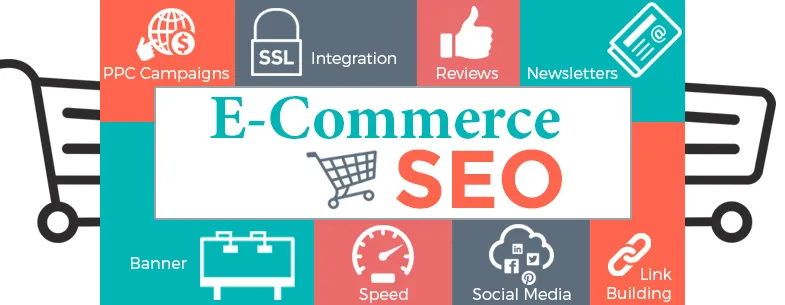In today’s digital landscape, social media in E-commerce SEO has emerged as a powerful method for businesses to connect with their target audience and drive growth.
When it comes to e-commerce, social media plays a vital role in improving search engine optimization (SEO) efforts. By effectively leveraging social media platforms, businesses can enhance their online presence, drive traffic to their websites, and boost conversions.
This article explores the role of social media in e-commerce SEO and provides insights on how to leverage it effectively.
Social media platforms such as Facebook, Instagram, Twitter, and LinkedIn have revolutionized the way people communicate and interact online.
With billions of active users, these platforms have become a goldmine for e-commerce SEO companies in India looking to expand their reach and connect with potential customers.
In the realm of e-commerce, where competition is fierce, leveraging social media for SEO purposes has become essential.
Understanding Social Media and E-commerce SEO

Before diving into the role of social media in e-commerce SEO, it’s crucial to understand the relationship between the two.
Social media refers to online platforms and websites that facilitate social networking and content sharing.
On the other hand, e-commerce SEO services involve optimizing a website to rank higher in search engine results pages (SERPs) to attract organic traffic and generate sales.
Importance of Social Media in E-commerce SEO

Increased Brand Visibility and Awareness
Social media platforms provide businesses with an opportunity to showcase their brand and products to a vast audience.
By creating engaging profiles and sharing valuable content, businesses can increase their brand visibility and raise awareness among potential customers.
Also, read: Common ASO Mistakes To Avoid When Promoting Your Game In App Stores
Targeted Audience Engagement
One of the key advantages of social media in e-commerce SEO is the ability to engage with a targeted audience.
Through features like hashtags and groups, businesses can connect with individuals who have a genuine interest in their products or services.
This targeted engagement can result in higher conversion rates and increased customer loyalty.
Improved Website Traffic and Conversions
Social media acts as a gateway to drive traffic to e-commerce websites.
By strategically placing links in social media posts and leveraging call-to-action buttons, businesses can entice users to visit their websites.
Increased website traffic, coupled with an optimized user experience, can lead to higher conversion rates and revenue.
Leveraging Social Media for E-commerce SEO Effectively
To make the most of social media for e-commerce SEO, businesses need to adopt effective strategies.
Here are some key steps to leverage social media effectively.
Also Read: How To Boost Your Website Traffic With Social Media?
Creating Engaging Social Media Profiles
When it comes to social media, first impressions matter. Businesses should create compelling and visually appealing profiles that reflect their brand identity.
Utilize high-quality images, engaging cover photos, and a consistent brand voice to capture the attention of potential customers.
Sharing High-Quality Content
Content is king in the world of social media. Businesses should focus on creating and sharing valuable, informative, and engaging content that resonates with their target audience.
This can include product updates, industry news, tips, tutorials, and user-generated content.
By consistently providing valuable content, businesses can establish themselves as thought leaders in their niche.
Utilizing Social Media Advertising
Social media advertising is a powerful tool to reach a wider audience and boost e-commerce SEO efforts. Platforms like Facebook, Instagram, and LinkedIn offer various advertising options to target specific demographics, interests, and behaviors.
By investing in targeted advertising campaigns, businesses can drive traffic to their website and increase conversions.
Influencer Marketing
Collaborating with influencers who have a significant following and influence in your target market can greatly impact e-commerce SEO.
Influencers can promote products, share reviews, and generate user-generated content, which increases brand visibility and credibility. Partnering with relevant influencers can attract new customers and drive sales.
Tracking and Analyzing Social Media Metrics

To measure the effectiveness of social media efforts, businesses should track and analyze relevant metrics.
This includes monitoring engagement rates, reach, click-through rates, conversions, and other key performance indicators (KPIs).
Analyzing data allows businesses to identify successful strategies, make data-driven decisions, and optimize their social media campaigns for better results.
Also Read: The Surprising Benefits Of Outsourcing Your SEO
Best Practices for Social Media and E-commerce SEO

To maximize the impact of social media on e-commerce SEO, consider the following best practices:
Consistent Branding Across Platforms
Maintain a consistent brand image and messaging across all social media platforms.
This includes using the same logo, color palette, and tone of voice. Consistency builds brand recognition and reinforces the connection between your social media presence and your e-commerce website.
Optimizing Social Media Profiles for SEO
Optimize social media profiles by including relevant keywords in the bio, headlines, and descriptions.
This helps search engines understand the purpose of your profiles and increases the chances of appearing in relevant search results.
Utilizing Relevant Keywords and Hashtags
When sharing content on social media, incorporate relevant keywords and hashtags to increase visibility and discoverability.
Research popular keywords and hashtags in your industry to align your content with trending topics and attract a wider audience.
Building Relationships with Influencers and Industry Leaders
Engage with influencers, industry leaders, and relevant communities by commenting, sharing, and mentioning them in your social media posts.
Building relationships with key players in your niche can expand your reach, attract new followers, and increase brand exposure.
Encouraging User-Generated Content

Encourage your followers to generate content related to your brand or products.
User-generated content provides social proof and enhances authenticity.
Run contests, ask for reviews and testimonials, and reshare user-generated content to foster a sense of community and loyalty.
Challenges and Limitations of Social Media in E-commerce SEO

While social media offers numerous opportunities for e-commerce SEO, it’s important to be aware of the challenges and limitations:
- Highly Competitive: Social media platforms are saturated with businesses vying for attention. Standing out in a crowded marketplace requires unique and compelling content strategies.
- Constant Algorithm Changes: Social media platforms frequently update their algorithms, affecting organic reach and visibility. Businesses need to stay updated on algorithm changes and adjust their strategies accordingly.
- Time and Resource Intensive: Effectively managing multiple social media platforms, creating high-quality content, and engaging with the audience requires dedicated time and resources. It’s important to allocate sufficient resources to maintain a consistent presence.
- Negative Feedback and Crisis Management: Social media can amplify negative feedback and customer complaints. Businesses must be prepared to handle negative interactions promptly and professionally to protect their brand reputation.
- Measuring ROI: Determining the direct impact of social media on SEO and calculating return on investment can be challenging. It’s essential to track relevant metrics, establish clear goals, and analyze data to measure the effectiveness of social media efforts.
Over To You
By creating engaging social media profiles, sharing high-quality content, utilizing advertising and influencer marketing, and analyzing metrics, businesses can effectively leverage social media to enhance their e-commerce SEO efforts.
Consider the best SEO company in Jaipur for the best social media e-commerce SEO solutions for your business.
Remember, social media is an ever-evolving landscape, and staying updated with the latest trends, algorithms, and best practices is vital.
By continuously adapting strategies, monitoring results, and optimizing social media campaigns, businesses can achieve long-term success in e-commerce SEO.
Also, read: 10 Shocking SEO Mistakes That Are Destroying Your Ranking
Frequently Asked Questions
How does social media impact SEO for e-commerce?
Social media indirectly impacts e-commerce SEO by increasing brand visibility, driving website traffic, and improving engagement metrics.
Which social media platforms are best for e-commerce SEO?
Facebook, Instagram, Twitter, LinkedIn, and Pinterest are popular platforms for e-commerce SEO, but it’s essential to research and understand where your target audience is most active.
What type of content should be shared on social media for e-commerce SEO?
Content should be diverse and tailored to your audience’s preferences. It can include product updates, informative blog posts, videos, user-generated content, tutorials, behind-the-scenes glimpses, and industry news.
How can influencer marketing help in e-commerce SEO?
Influencer marketing involves partnering with individuals who have a significant following and influence in your target market.

